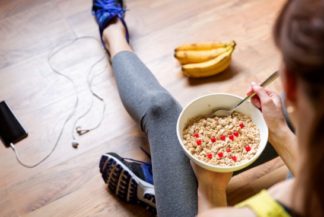Making Nutrition Simple

Your guide to eating nutritiously
When it comes to health, most of us know the basics – eat your fruit and veggies, get enough exercise and drink enough water. But how much of everything should we be eating? Let’s break it down into five different food groups: fruit & vegetables, carbohydrates, dairy or dairy alternatives, protein and unsaturated fats.
Fruit and vegetables should make up a big chunk of your diet and the best way to do this is to make sure that you eat five portions of a variety of different fruits and veggies per day. Carbohydrates are very important as they give you slow releasing energy – but you have to make sure they’re whole grain. These should make up just over a third of your diet. Dairy and dairy alternatives are an important source of protein and vitamins but they’re mostly important for their high levels of calcium to keep your bones and teeth healthy. Beans, pulses, eggs and fish are some of the best sources of protein so make sure you’ve got plenty of those in your diet too. And lastly, the unsaturated fats such as oils and spreads are important (in small doses) as they are high in energy.
Bad fats vs. healthy fats
It can be tricky to know what fats to avoid and which fats are good for you. But the bad fats that are to be avoided are saturated and trans fats. Saturated fats are found in foods such as: high fat dairy foods, fatty cuts of beef, pork and lamb. Trans fats are found in: fried food, processed snack foods and baked goods such as pastries. Trans fats should be avoided where possible and saturated fats should be eaten in moderation.
But there are healthy fats too! Monounsaturated fats have been shown to actually improve your blood cholesterol level making them a help for your health rather than a hindrance. This healthy fat is found in nuts and nut butters, vegetable oils and avocados. Another healthy fat is polyunsaturated fat which you can find in all your favourite fish like salmon, herring and trout and also in flaxseed and chia seeds. At the end of the day, it’s about getting all the goodness you can out of your food. Food shouldn’t be calorie focused, it’s all about fuelling your body and staying as active as possible!
Healthy snacks
When it comes to snacking, we know it’s best to steer clear of foods such as crisps and chocolate as they come with a load of added sugar and salt that doesn’t actually fuel your body and is just excess calories. While these can be enjoyed as a one off every now and then, why not buy a TREK bar instead? Our TREK bars are full of protein, carbs and fats that will keep you going for longer. There are even chocolate treats to be had like the Dark Chocolate & Sea Salt protein bar or the Cocoa Oat Protein Flapjack.
Nutrition facts
When it comes to nutrition, there are some general rules that we can all follow in order to live in optimum health and happiness. These nutrition facts are the best guides to follow if you’re looking to improve your health!
- Added sugar is a no go – added sugar is just empty calories that do nothing for your health and have no nutritional value whatsoever. Sure, we all love to treat ourselves to a cake or two every so often but these treats should be kept as minimal as possible. However, naturally occurring sugars such as fructose in fruits and lactose in dairy products are a great addition to any diet so if you’ve got a craving for something sweet, why not go for some fruit instead! Want to find out more about sugar? Check out our sugar blog for a more in depth look at the sweet stuff.
- Not all carbs are bad! Yes, you read that correctly, whole grain carbs are a necessity in your diet as they are high in nutrients and fibre. However, refined carbs aren’t your friend as they have been stripped of their nutritional value and can even cause rapid spikes of blood sugar which is particularly dangerous in people with diabetes.
- Eat your veggies! – this one is pretty self explanatory and one that we all know – but we don’t always stick to! Try and make sure you’re eating some vegetables every day to ensure you get the best nutrients.
- There is no one size fits all when it comes to diet – different bodies have different needs and not every diet is going to suit every person so don’t get caught up in fad dieting. The best diet is a balanced diet that you can stick to long term – this means making sure you get your 5 a day, avoiding as many processed foods as possible and sticking to whole grains rather than refined grains. The best way to test what works best for you is through trial and error – we all find our balance in the end!
- Supplements can’t replace the real thing – as good as supplements are, they still are subpar in comparison to the real deal as there is more variety within actual foods. However, there are some occasions where supplements can be useful (like vitamin D) as they’re naturally lacking in the diet.
At TREK, we strongly believe that food is fuel and therefore we should be making sure our food comes from natural sources. We believe in real food that is free of any additives and anything artificial – nature always knows best!
Essential vitamins
It can be tricky to make sure you get all the vitamins and minerals you need every day. Our diets change due to lack of time, mood and all kinds of other variables. That’s where vitamin supplements can really help you out! There’s an abundance to choose from and a lot that are tailored specifically to men or women. Or if you don’t like taking lots of different vitamins, there are multivitamin for men and multivitamin for women options too! Of course, all of these vitamins and minerals occur naturally in different foods but if you need a boost or there are certain foods you can’t eat, supplements are a great way to go. Let’s take a look at the vitamins that are the most important.
- Vitamin A – this vitamin is necessary to keep your skin and eyes healthy and also to keep your immune system working properly. You can find vitamin A in foods such as eggs and oily fish and also in yellow fruit such as mangoes, papaya and apricots.
- Vitamin C – this is a super important vitamin for your immune system and for collagen production. Citrus fruits and orange juice are full of vitamin C, as are peppers, strawberries and broccoli.
- B vitamins – these vitamins are vital for red blood cell count and for your metabolism. You can find B vitamins in nuts, eggs, mushrooms, fish, whole grains, bananas, and some fortified breakfast cereals.
- The best vitamins and minerals to keep your bones healthy are: calcium, magnesium, zinc and vitamins D and K – You can find calcium in milk and other dairy foods as well as leafy greens such as kale. Magnesium is found in nuts and spinach; zinc is in bread and dairy foods; vitamin K is present in green leafy vegetables and vegetable oils and vitamin D is found in mushrooms and fortified cereals.
- Vitamin E and selenium – these two help to keep your cells protected. Selenium is found in foods such as brazil nuts and eggs and vitamin E is found in nuts and seeds.
Thanks for joining our introduction to nutrition! This brief guide gives an overview of what kinds of foods, vitamins and minerals are key to living your life in optimum health. However, this isn’t tailormade to fit all so make sure you’re checking in with your body and making sure you always feel in the best condition possible! Keep an eye out for our blogs on men’s nutrition and women’s nutrition for a more meticulous look at nutrition.
Find our women’s nutrition guide here: https://eattrek.com/blog/an-easy-guide-to-womens-nutrition/
Find our men’s nutrition guide here: https://eattrek.com/blog/an-easy-guide-to-mens-nutrition/





